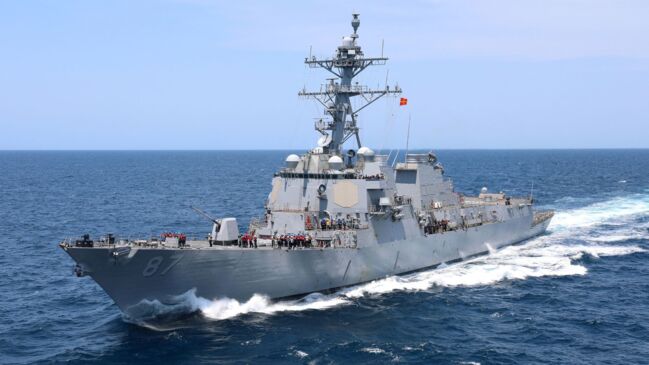Red Sea attacks threaten exports and supply chains
Attacks on shipping in the Red Sea could hit global supply lines and delay the delivery of major industrial and consumer staples including chemicals, steel, cars and food products.
S&P Global Market Intelligence warns the conflict could cause container shipping capacity to drop by the equivalent of 7 per cent, with consumer goods most affected on Asia-to-Europe routes, while autos were most exposed on Europe-to-Asia.
Australia’s peak freight body warns the conflict could result in higher shipping costs.
Major container shipping firms have paused transits of the strait of Bab al-Mandab, the Red Sea and Suez Canal in response to attacks by the Yemen-based Houthi militant group.
The conflict in the Red Sea,where about 12 per cent of the world’s seaborne trade transits, is forcing shippers to delay deliveries from Asia to Europe by sailing around Southern Africa rather than through the Suez Canal.
Eight of the top 10 container lines have confirmed they will re-route away from the strait, while all three major shipping alliances will halt services, covering up to 85 per cent of all container fleet crossings of the Suez Canal. The Red Sea attacks come as drought has left water levels too low for shipping in the Panama Canal, reducing volume through one of the world’s shipping choke-points.
S&P said the Red Sea attacks were likely to continue to target international shipping, irrespective of any public connection to Israel.
The attacks are part of a broader regional confrontation between Iran’s allies and the US and Israel, following the terrorist attack by Hamas on the Jewish state in October.
A US-led naval task force is expected to provide additional air defence cover for vessels transiting Bab al-Mandab into the Red Sea, but probably not military strikes on Houthi military targets in Yemen unless participant naval vessels are targeted and sustain damage, or there are crew fatalities in strikes.
International Forwarders and Customs Brokers Association of Australia chief executive Scott Carson said forwarders, customs brokers and importers/exporters should continue to monitor new surcharges and increased shipping rates introduced in the face of the Middle East conflict.
“Shipping lines may look to underpin rate increases in the medium term due to this current challenge in the Red Sea, which may be only be a short term challenge,” said Mr Carson.
“It is hard to predict at this stage.”
S&P Global Market Intelligence said voyages via the Cape of Good Hope added at least 10 days and over 15 per cent to shipping costs.
“Slower shipping equates to additional capacity required for the same volume of shipments,” S&P said.
“Assuming a 10-day longer voyage, that could under some circumstance mean an additional 7.1 per cent capacity needed from the global fleet.”
Mr Carson said Maersk, one of the world’s largest shipping lines, was monitoring the situation on a ship-by-ship basis. “Earlier today they made a decision to take the Red Sea route with one ship and will monitor that,” he said. “The US Red Sea coalition is helping with increased naval ships under secondment and on standby and are assisting with regional patrols and if need be accompanying ships on this route.”
The Israel-Hamas war also is having a knock-on effect on supply chains elsewhere in the world, with Malaysian Prime Minister Anwar Ibrahim banning Israeli shipping company ZIM from docking in any Malaysian port. The government also announced a ban on Israeli-flagged ships and ships bound for Israel from unloading or loading cargo in Malaysian ports.
Consultancy KPMG warned in October that Australian supply chains are underfunded and poorly prepared than global peers to handle new challenges threatening to cause fresh disruption after upheaval during the pandemic.
Supply chains across the country remain focused on building resilience after Covid-19, but KPMG has found that they lack the investment needed to handle disruptions in the future stemming from inflation, freight costs, geopolitical conflicts and a rise in ESG requirements.
Covid-19 saw supply chains crack under the weight of labour shortages, shifts in demand and structural factors, but the next challenges were likely to be from decarbonisation and geopolitical factors. Over the longer term, KPMG expects substantial growth in businesses taking up advanced robotics and automation, expanding the range of activities these tools will perform across the supply chain.
Originally published as Red Sea attacks threaten global shipping supply chains
